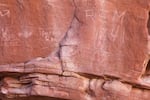Those consequences begin on the public lands closest to Cliven Bundy's ranch. At the Gold Butte National Monument, just south of the ranch, Bundy's cattle roam free and damage Native American petroglyphs that are roughly 12,000 years old.
“For any part of that scenery to be ruined, to be destroyed, is an atrocity. It’s awful," said Fawn Douglas, a member of the Las Vegas Paiute Tribe and teacher of indigenous studies at the University of Nevada, Las Vegas.

Many carvings cover sandstone near ancient petroglyphs in the Gold Butte National Monument. This one says "Davy Bundy."
Leah Sottile / for OPB
Federal policies are supposed to protect the many different cultural heritages that exist in the West, whether that history is represented by petroglyphs or cattle. But the Bundys' quest to have their way of life stand supreme over all others has led to attacks on public lands protections.
And those attacks extend beyond Gold Butte.
There is a political movement underway in Washington, D.C., to shrink public lands and give traditional users like the Bundys more access for resource extraction.
In 2017, the Interior Department and President Trump decided to shrink the Bears Ears National Monument in Utah by around 80 percent. And there have been talks of shrinking other monuments around the country, from Oregon to Maine, as a way to give ranchers, miners and oil companies more rights to land that had previously belonged equally to all Americans.
And Cliven Bundy's movement has consequences perhaps even more serious than public lands. People have died and continue to be threatened because of it.
In 2014, after the Bunkerville standoff in Nevada, a couple with deep anti-government sentiment shot and killed two Las Vegas police officers as they ate lunch. Jerad and Amanda Miller were at Bundy Ranch, and they were energized by the Bundys' anti-government message. It fueled their own delusions about a coming police state in America.
After killing the officers at a pizza restaurant, the pair went to a nearby Walmart store and killed another man before police killed Jerad Miller and Amanda Miller killed herself.
The Bundy family claims they kicked the Millers out of the Bunkerville event because they were too extreme, but there's no evidence of that.
In 2016, after the occupation of the Malheur National Wildlife Refuge in Oregon, the leader of a Utah militia group tried to blow up a Bureau of Land Management cabin. Bill Keebler had ties to Arizona rancher Robert 'LaVoy' Finicum.
The only reason Keebler did not successfully detonate the bomb is because the FBI infiltrated his group and gave him a fake device. Keebler pleaded guilty to the charges in late April. But many Bundy supporters are still coming to Keebler's defense, saying he stands for freedom in America.
All of these things have happened or been influenced by Cliven Bundy's efforts to short-circuit the balance of powers put in place by federal land management policies.
He is seizing power rather than working within a system that requires compromise and slow progress. And the government tried to seize it back in Nevada by lying in court.
The end result has been a continually escalating conflict with no clear resolution in sight.
And so, the question remains, with the Bundy family out of jail and emboldened by the outcome of events over the past four years, what else could be lost?
About "Bundyville"
“Bundyville” is a joint podcast by OPB and Longreads, hosted and reported by award-winning freelance journalist Leah Sottile. It is produced by Peter Frick-Wright and Robert Carver of 30 Minutes West Productions, and OPB’s Ryan Haas.
Subscribe to “Bundyville” on NPR One, Apple Podcasts or wherever you find your podcasts.
